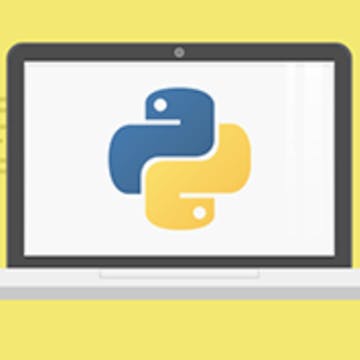
ابدأ تعلم لغة بايثون لعلوم البيانات، بالإضافة إلى البرمجة بوجه عام مع هذه المقدمة البسيطة للمبتدئين في تعلم لغة بايثون. تعتبر بايثون واحدة من أشهر لغات البرمجة في العالم، وهي تشهد إقبالاً غير مسبوق عليها من جانب المحترفين، حيث تمنحهم القدرة على تطبيق المبادئ الأساسية للغة بايثون لتطوير حلول الأعمال في مختلف الصناعات.
ستنقلك هذه الدورة من مستوى المبتدئين إلى البرمجة في بايثون خلال ساعات، وليس من الضروري أن تكون لديك خبرات سابقة في البرمجة! ستتعلم المبادئ الأساسية للغة بايثون، بما في ذلك هياكل البيانات وتحليل البيانات، وتستكمل التدريبات التطبيقية في وحدات الدورة، وتمتلك القدرة على إنشاء مشروع نهائي يبرز مهاراتك الجديدة.
مع نهاية...
Read more
Good to know
Save this course
Activities
Review the book 'Python Crash Course' by Eric Matthes
Show steps
This comprehensive guide will provide you with a solid foundation in Python programming and help you advance your skills.
View
Python Crash Course, 3rd Edition: A Hands-On,...
on Amazon
Show steps
-
Read the book and take notes on key concepts
-
Complete the exercises and projects in the book
-
Review the book's summary and test your understanding
Brush up on Python basics
Show steps
Review the basics of Python to ensure you have a strong foundation for this course.
Browse courses on
Python Basics
Show steps
-
Review Python syntax and data types
-
Practice writing simple Python programs
-
Complete Python tutorials or online exercises
Show all two activities
Review the book 'Python Crash Course' by Eric Matthes
Show steps
This comprehensive guide will provide you with a solid foundation in Python programming and help you advance your skills.
View
Python Crash Course, 3rd Edition: A Hands-On,...
on Amazon
Show steps
- Read the book and take notes on key concepts
- Complete the exercises and projects in the book
- Review the book's summary and test your understanding
Brush up on Python basics
Show steps
Review the basics of Python to ensure you have a strong foundation for this course.
Browse courses on
Python Basics
Show steps
- Review Python syntax and data types
- Practice writing simple Python programs
- Complete Python tutorials or online exercises
Career center
Data Scientist
Data Analyst
Machine Learning Engineer
Artificial Intelligence Engineer
Software Engineer
Business Analyst
Data Engineer
Financial Analyst
Biostatistician
Epidemiologist
Statistician
Operations Research Analyst
Market Research Analyst
Quantitative Analyst
Cybersecurity Analyst
Reading list
Share
Similar courses
OpenCourser helps millions of learners each year. People visit us to learn workspace skills, ace their exams, and nurture their curiosity.
Our extensive catalog contains over 50,000 courses and twice as many books. Browse by search, by topic, or even by career interests. We'll match you to the right resources quickly.
Find this site helpful? Tell a friend about us.
We're supported by our community of learners. When you purchase or subscribe to courses and programs or purchase books, we may earn a commission from our partners.
Your purchases help us maintain our catalog and keep our servers humming without ads.
Thank you for supporting OpenCourser.



